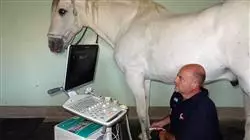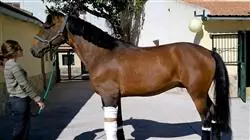University certificate
The world's largest faculty of veterinary medicine”
Introduction to the Program
Large animals can have complex pathologies, so it is necessary to have specialized veterinarians who can treat them”

The Professional master’s degree in Internal Medicine in Large Animals incorporates innovative knowledge, based on the latest scientific evidence, that allows veterinary professionals to stay up-to-date on the newest treatments and emerging diseases that affect large animals across the world as a consequence of globalization. Specialized and advanced knowledge of these diseases is necessary since outbreaks of some diseases considered eradicated or new ones may occur in all countries of the world.
Clinical practice is a very dynamic activity, new treatments are constantly appearing in scientific publications and veterinarians must be aware of them in order to be able to offer these options to their clients. Each of the modules in this Professional master’s degree covers one of the organ systems, with emphasis on those systems that are most frequently affected in the large animals
With respect to ruminants, although their handling and the diseases they suffer from are different from those of horses, they must also be understood with sufficient scientific expertise to be able to establish adequate treatments and accurate prognoses. Camelids of the new world or South America, which include mainly llamas and alpacas as domesticated animals, are animals bred for different purposes including fiber production, pack animals or meat production in South America. Horses are animals that are used both for leisure and as companion animals, as well as in different sports disciplines, which adds an important added economic value. It is essential to have a high level of knowledge in internal medicine to be able to work with these horses, since, due to their economic value, they are not readily accessible to clinicians with little training
This Professional master’s degree is designed by professors with the highest recognized degree of specialization, thus guaranteeing quality in all aspects, both clinical and scientific, in large animals.
Get trained with us and learn how to diagnose and treat diseases in large animals, in order to improve their quality of life"
This Professional master’s degree in Internal Medicine in Large Animals contains the most complete and up-to-date educational program on the market. The most important features include:
- Practical cases presented by experts in Internal Medicine in Large Animals
- The graphic, schematic, and practical contents with which they are created provide scientific and practical information on the disciplines that are essential for professional practice
- Latest innovations on Internal Medicine in Large Animals
- Practical exercises where the self-assessment process can be carried out to improve learning
- Special emphasis on innovative methodologies in Internal Medicine in Large Animals
- Theoretical lessons, questions to the expert, debate forums on controversial topics, and individual reflection assignments
- Content that is accessible from any fixed or portable device with an Internet connection
With this Professional master’s degree, you will learn to establish a specific clinical approach to horses with cardiac or vascular alterations”
Its teaching staff includes professionals belonging to the veterinary field, who contribute their expertise to this specialization, as well as renowned specialists from leading societies and prestigious universities.
The multimedia content, developed with the latest educational technology, will provide the professional with situated and contextual learning, i.e., a simulated environment that will provide immersive training programmed to train in real situations.
This program is designed around Problem-Based Learning, whereby the specialist must try to solve the different professional practice situations that arise throughout the program. For this, the professional will have the help of an innovative interactive video system made by renowned and experienced experts in Internal Medicine in Large Animals.
This program comes with the best educational material, providing you with a contextual approach that will facilitate your learning"

Thanks to this program you will be capable of establishing an appropriate methodology for the examination of a patient with urinary and renal problems, among others"
Why study at TECH?
TECH is the world’s largest online university. With an impressive catalog of more than 14,000 university programs available in 11 languages, it is positioned as a leader in employability, with a 99% job placement rate. In addition, it relies on an enormous faculty of more than 6,000 professors of the highest international renown.

Study at the world's largest online university and guarantee your professional success. The future starts at TECH”
The world’s best online university according to FORBES
The prestigious Forbes magazine, specialized in business and finance, has highlighted TECH as “the world's best online university” This is what they have recently stated in an article in their digital edition in which they echo the success story of this institution, “thanks to the academic offer it provides, the selection of its teaching staff, and an innovative learning method aimed at educating the professionals of the future”
A revolutionary study method, a cutting-edge faculty and a practical focus: the key to TECH's success.
The most complete study plans on the university scene
TECH offers the most complete study plans on the university scene, with syllabuses that cover fundamental concepts and, at the same time, the main scientific advances in their specific scientific areas. In addition, these programs are continuously being updated to guarantee students the academic vanguard and the most in-demand professional skills. In this way, the university's qualifications provide its graduates with a significant advantage to propel their careers to success.
TECH offers the most comprehensive and intensive study plans on the current university scene.
A world-class teaching staff
TECH's teaching staff is made up of more than 6,000 professors with the highest international recognition. Professors, researchers and top executives of multinational companies, including Isaiah Covington, performance coach of the Boston Celtics; Magda Romanska, principal investigator at Harvard MetaLAB; Ignacio Wistumba, chairman of the department of translational molecular pathology at MD Anderson Cancer Center; and D.W. Pine, creative director of TIME magazine, among others.
Internationally renowned experts, specialized in different branches of Health, Technology, Communication and Business, form part of the TECH faculty.
A unique learning method
TECH is the first university to use Relearning in all its programs. It is the best online learning methodology, accredited with international teaching quality certifications, provided by prestigious educational agencies. In addition, this disruptive educational model is complemented with the “Case Method”, thereby setting up a unique online teaching strategy. Innovative teaching resources are also implemented, including detailed videos, infographics and interactive summaries.
TECH combines Relearning and the Case Method in all its university programs to guarantee excellent theoretical and practical learning, studying whenever and wherever you want.
The world's largest online university
TECH is the world’s largest online university. We are the largest educational institution, with the best and widest online educational catalog, one hundred percent online and covering the vast majority of areas of knowledge. We offer a large selection of our own degrees and accredited online undergraduate and postgraduate degrees. In total, more than 14,000 university degrees, in eleven different languages, make us the largest educational largest in the world.
TECH has the world's most extensive catalog of academic and official programs, available in more than 11 languages.
Google Premier Partner
The American technology giant has awarded TECH the Google Google Premier Partner badge. This award, which is only available to 3% of the world's companies, highlights the efficient, flexible and tailored experience that this university provides to students. The recognition as a Google Premier Partner not only accredits the maximum rigor, performance and investment in TECH's digital infrastructures, but also places this university as one of the world's leading technology companies.
Google has positioned TECH in the top 3% of the world's most important technology companies by awarding it its Google Premier Partner badge.
The official online university of the NBA
TECH is the official online university of the NBA. Thanks to our agreement with the biggest league in basketball, we offer our students exclusive university programs, as well as a wide variety of educational resources focused on the business of the league and other areas of the sports industry. Each program is made up of a uniquely designed syllabus and features exceptional guest hosts: professionals with a distinguished sports background who will offer their expertise on the most relevant topics.
TECH has been selected by the NBA, the world's top basketball league, as its official online university.
The top-rated university by its students
Students have positioned TECH as the world's top-rated university on the main review websites, with a highest rating of 4.9 out of 5, obtained from more than 1,000 reviews. These results consolidate TECH as the benchmark university institution at an international level, reflecting the excellence and positive impact of its educational model.” reflecting the excellence and positive impact of its educational model.”
TECH is the world’s top-rated university by its students.
Leaders in employability
TECH has managed to become the leading university in employability. 99% of its students obtain jobs in the academic field they have studied, within one year of completing any of the university's programs. A similar number achieve immediate career enhancement. All this thanks to a study methodology that bases its effectiveness on the acquisition of practical skills, which are absolutely necessary for professional development.
99% of TECH graduates find a job within a year of completing their studies.
Professional Master's Degree in Internal Medicine in Major Species
.
In order to provide adequate care and maintain full health in major species such as equids (horses, donkeys, mules), bovids (bulls, cows, antelopes, goats, sheep) and camelids (llamas, alpacas), it is essential that veterinarians perform medical checkups periodically in order to detect any abnormality in time. An in-depth study in this area is necessary, since it makes it easier for personnel to act at the time of treating any outbreak or specific pathology. This helps to monitor the health status of the animals and provide immediate attention if necessary. With the motivation to offer professionals the latest clinical developments for the proper care of animals, TECH designed a Professional Master's Degree in Internal Medicine in Major Species. A high quality program that provides the most updated knowledge on the therapeutic currents that help treat the diseases present in these species. Throughout 12 months of preparation in virtual mode, students will develop specific skills to promptly recognize certain abnormal symptoms; thus, they will be able to establish protocols and procedural guidelines to provide timely and effective treatments.
Take a Professional Master's Degree in Internal Care of the Elderly
.
At TECH you will receive intensive training focused on acquiring the necessary skills to provide medical assistance to these animals. You will have at your fingertips an organic learning system, which will allow you to specialize in identifying all clinical signs associated with cardiovascular, neurological, gastrointestinal and respiratory diseases; as well as ophthalmological, dermatological, endocrine, urinary and renal diseases. Therefore, you will be an expert in designing from diagnostic protocols with complementary tests; to the specific and appropriate approach in the exploration of each patient. As a result, you will not only specialize in treating congenital, immune-mediated, infectious and parasitic pathologies, but you will also be able to establish health guidelines for the correct care of animals in neonatal and geriatric stages. Thanks to our online methodology you will be able to access the course at the time, place and schedule that best suits you, to do so you only need to have some device connected to the internet.







